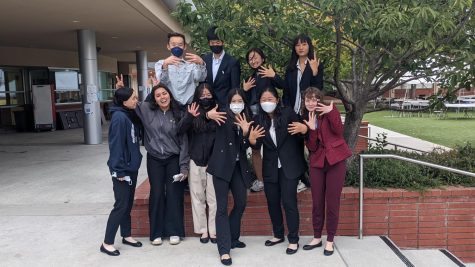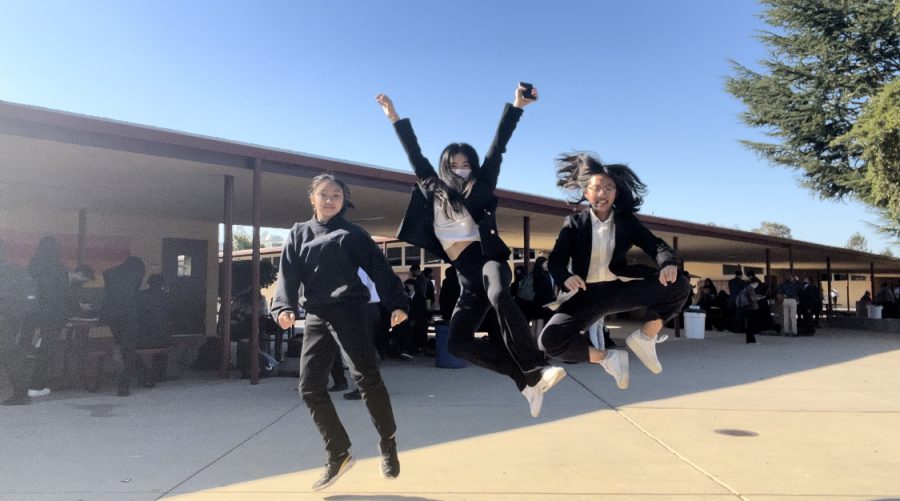Three debaters at Coast Forensic League Superdebate jump for a picture.
Fighting back
March 30, 2023
“Welcome to the protest.”
In the 2021 Tournament of Champions (TOC) — the Super Bowl of the debate world — the two top Public Forum debate teams participated in a rather unconventional debate round. Instead of debating the assigned topic, one team chose to read a speech on how transgender debaters are excluded from the debate space, explaining that using the round as a platform to call out discrimination in the debate space was the only way to make real change.
“This round is going to be a debate about debate,” the winning team said. “We have tried politeness, we have tried blog posts and infographics, but the only way the debate community will change is if we hold their most sacred currency for ransom — ballots.”
After hearing the first team detail the misgendering and abuse they and other transgender debaters often experience in debate, their opponents conceded the round. Instead of demanding to argue the original topic decided by the National Speech and Debate Association, the two teams agreed that the final round of TOC — a tournament that may take a debater hundreds or thousands of hours of preparation to qualify for — was the best place to discuss this issue. The next 45 minutes became a discussion between the judges, debaters and spectators about how to make the debate space more inclusive.
Debate is designed to be self-regulating, a space that allows for discourse not only about the assigned topics but also about the very structure of debate.
“You see students get together and have forums,” Lue said. “We discuss what’s important to us: What do we need to change? What is something that people are having problems within this space?”

An article published by Victory Brief Institutes describes this form of debating — debating about debate — as theory, a newer “progressive” form of argumentation. “The original purpose of theory was to check back against unfair, or ‘abusive,’ arguments or practices in debate. Theory isn’t intended to determine if a rule was broken; rather, it’s an ever-evolving understanding of how debate should function.”
Essentially, if something about the debate round isn’t fair or educational, then debaters are able to use a theory argument instead of, or in addition to, arguing the original topic. This type of progressive argumentation can range from trying to prevent bad debate practices, such as repeated misgendering, or specific debate arguments by targeting underlying assumptions in the round, such as capitalism or the United States’ global dominance inherently being good.
However, this is an imperfect solution. While the freedom to publicly point out flaws in debate gives the event the ability to grow and improve, debaters have also taken advantage of this alternative form of argumentation, using theory to win a round instead of making meaningful changes to debate.
“I think theory in Public Forum debate can be useful, especially when used to further a cause or make something more fair and equitable,” former debater Sierra Howard, ‘19 said.
Howard and her partner used a progressive argument in their senior year against debaters who claimed that giving domestic abuse victims a few thousand dollars a month would enable them to escape their abuser, pointing out the nuances in abuse and calling out their opponents for trivializing the seriousness of abuse.
“It’s tough because sometimes you make things unfair by even using theory arguments because it takes a lot of resources for a team to learn about and successfully use theory. You have to weigh the importance of your theory against the chance you’re edging someone out of a round,” Howard said.
Herman believes that change in the debate space shouldn’t rest solely on the shoulders of high school students but rather needs to start with their coaches. She explains that certain private debate academies or students who hire private coaches don’t necessarily do as much to background check who they hire as other schools do.
“[Coaches] are usually selected for their competitive success, and not necessarily their integrity or their history of working with students or their ability to behave safely and properly with students,” Herman said.
Another avenue for change that has support among the MVLA team is an increased emphasis on judge training. When judges submit ballots, they already see a short disclaimer about being mindful of biases.
“We get what you would call a lottery of judges, and sometimes you just lose the lottery,” Ong said. “It’s really unfortunate because then it becomes less of a debate on skill and more of a debate on if you’re just unlucky with a judge.”
Speech & Debate isn’t the cause of society’s problems, but it does amplify many of them. However, it also uniquely sets up the community to lead the charge against changing many traditional norms of professional speaking and dress. By making a conscious decision not to impose the same outdated standards that have plagued the professional world for years on teenagers, the event can change — not just itself but also the countless students and judges that go through it.

